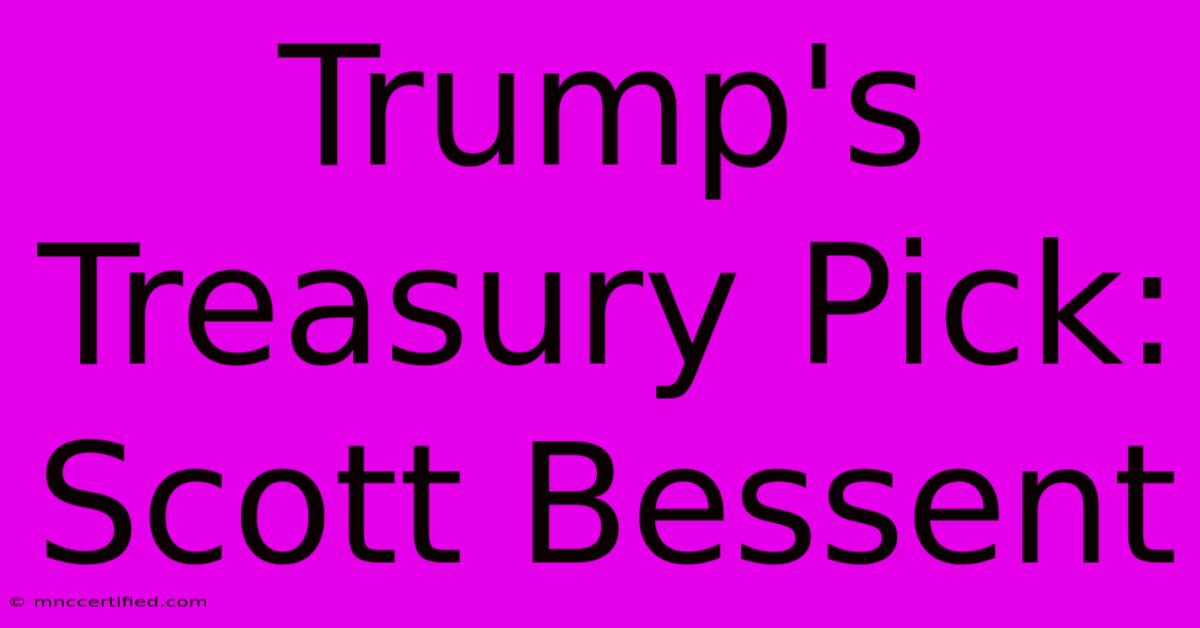Trump's Treasury Pick: Scott Bessent

Table of Contents
Trump's Treasury Pick: Scott Bessent – A Deep Dive into the Potential Appointment
Donald Trump's potential appointments to key positions always generate significant media attention and public discussion. One name that's recently surfaced in relation to a potential Treasury Secretary role is Scott Bessent. While not officially nominated, exploring his background, experience, and potential implications offers valuable insight into the possible direction of US fiscal policy. This article delves into Bessent's career, his investment strategies, and analyzes his suitability for such a crucial government position.
Who is Scott Bessent?
Scott Bessent is a highly successful hedge fund manager known for his sharp investment acumen and contrarian strategies. He's garnered a reputation for making bold, high-stakes bets, often defying conventional wisdom. His career trajectory demonstrates a remarkable ability to navigate complex financial markets and achieve significant returns. Understanding his investment philosophy is crucial to assessing his potential impact on the US Treasury.
Bessent's Investment Background: A Track Record of Success and Risk
Bessent's career began at Goldman Sachs, where he honed his skills in financial analysis and trading. However, he truly made his mark after establishing his own firm, Keystone Capital. Keystone's investment strategy is characterized by its focus on long-term value investing and a willingness to take calculated risks. Bessent's success hasn't been without its challenges; he's experienced both significant wins and losses, highlighting the inherent volatility of his chosen field. His investment portfolio often includes a diverse range of assets, from equities to real estate and commodities.
Key aspects of Bessent's investment approach:
- Contrarian investing: He often bets against the prevailing market sentiment.
- Long-term perspective: He focuses on long-term value creation, rather than short-term gains.
- High-risk, high-reward strategy: His investment approach involves significant risk-taking, with the potential for substantial returns.
Bessent and the Treasury: Potential Implications
Speculation regarding Bessent as a potential Treasury Secretary raises critical questions about the future direction of US fiscal policy. His extensive experience in private finance could bring a unique perspective to the role. However, his history of high-risk investments raises concerns about his suitability for managing the nation's finances.
Potential Benefits: A Private Sector Perspective
A key argument in favor of Bessent's appointment is his deep understanding of financial markets and his ability to make bold decisions. His experience could provide a valuable counterpoint to traditional government approaches to fiscal management. Furthermore, his private sector background could foster greater collaboration between the public and private sectors.
Potential Drawbacks: Risk Tolerance and Conflicts of Interest
His contrarian investment style, while successful in the private sector, might not translate well to the complexities of government policy. The risk-taking approach that defines his career could be deemed excessive when managing public funds. Additionally, navigating potential conflicts of interest stemming from his past investments would be a significant challenge. Transparency and accountability would be paramount in such a scenario.
Analyzing the Suitability: A Balanced Perspective
Assessing Scott Bessent's suitability for the Treasury Secretary position requires a balanced perspective. His undeniable success in the private sector provides compelling evidence of his financial expertise. However, the inherent differences between managing a private investment fund and the US Treasury demand careful consideration. His high-risk investment approach, while profitable for him, may not be appropriate for the careful management of public funds. The potential for conflicts of interest also necessitates thorough vetting and rigorous ethical safeguards.
Ultimately, any decision regarding his appointment must weigh the potential benefits of his unique perspective against the risks associated with his unconventional approach to finance. Further investigation and public debate are crucial to ensure a fully informed decision. The appointment of a Treasury Secretary is a matter of significant national importance, demanding rigorous scrutiny of the candidate's qualifications and potential impact on the US economy.

Thank you for visiting our website wich cover about Trump's Treasury Pick: Scott Bessent. We hope the information provided has been useful to you. Feel free to contact us if you have any questions or need further assistance. See you next time and dont miss to bookmark.
Featured Posts
-
Romi Rain Trading Sides Part 1
Nov 26, 2024
-
Oriental Trading Christmas Bags
Nov 26, 2024
-
Truck Insurance For New Drivers
Nov 26, 2024
-
Cleopatra And Nile Cruisers Joint Nile Tours
Nov 26, 2024
-
Dodge And Cox Global Bond Fund
Nov 26, 2024